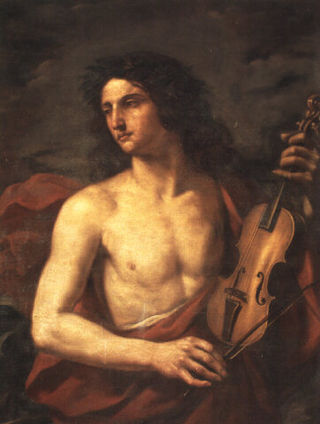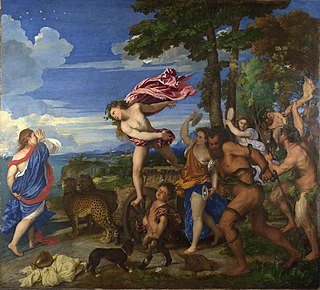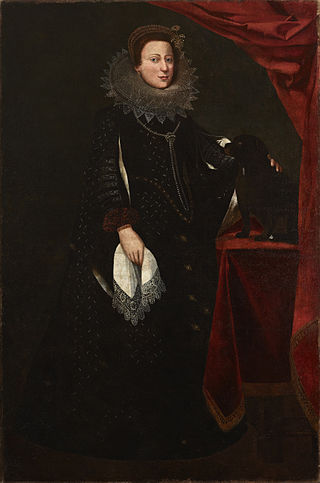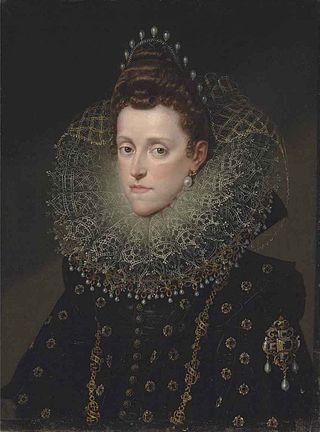Related Research Articles

Claudio Giovanni Antonio Monteverdi was an Italian composer, choirmaster and string player. A composer of both secular and sacred music, and a pioneer in the development of opera, he is considered a crucial transitional figure between the Renaissance and Baroque periods of music history.

Mantua is a comune (municipality) in the Italian region of Lombardy, and capital of the province of the same name.
Giaches de Wert was a Franco-Flemish composer of the late Renaissance, active in Italy. Intimately connected with the progressive musical center of Ferrara, he was one of the leaders in developing the style of the late Renaissance madrigal. He was one of the most influential of late sixteenth-century madrigal composers, particularly on Claudio Monteverdi, and his later music was formative on the development of music of the early Baroque era.

L'Orfeo, or La favola d'Orfeo, is a late Renaissance/early Baroque favola in musica, or opera, by Claudio Monteverdi, with a libretto by Alessandro Striggio. It is based on the Greek legend of Orpheus, and tells the story of his descent to Hades and his fruitless attempt to bring his dead bride Eurydice back to the living world. It was written in 1607 for a court performance during the annual Carnival at Mantua. While Jacopo Peri's Dafne is generally recognised as the first work in the opera genre, and the earliest surviving opera is Peri's Euridice, L'Orfeo is the earliest that is still regularly performed.

Vincenzo Ι Gonzaga was the ruler of the Duchy of Mantua and the Duchy of Montferrat from 1587 to 1612.

Margaret of Savoy was the last Habsburg Vicereine of Portugal from 1634 to 1640. In Portuguese she is known as Duquesa de Mântua, being by marriage the Duchess of Mantua and Montferrat. She was also regent of Montferrat during the minority of her daughter from 1612.

Margherita Barbara Gonzaga, was an Italian noblewoman, Duchess consort of Ferrara, Modena and Reggio between 1579 and 1597 by marriage to Alfonso II d'Este, Duke of Ferrara, Modena and Reggio. She was a significant cultural patron in Ferrara and Modena.

Adriana Basile was an Italian composer and singer.

Ferdinand I Gonzaga was Duke of Mantua and Duke of Montferrat from 1612 until his death.

L'Arianna is the lost second opera by Italian composer Claudio Monteverdi. One of the earliest operas in general, it was composed in 1607–1608 and first performed on 28 May 1608, as part of the musical festivities for a royal wedding at the court of Duke Vincenzo Gonzaga in Mantua. All the music is lost apart from the extended recitative known as "Lamento d'Arianna". The libretto, which survives complete, was written in eight scenes by Ottavio Rinuccini, who used Ovid's Heroides and other classical sources to relate the story of Ariadne's abandonment by Theseus on the island of Naxos and her subsequent elevation as bride to the god Bacchus.

Francesco IV Gonzaga was duke of Mantua and Montferrat between 9 February and 22 December 1612.

Camilla Faà di Bruno, also da Casale, also Camilla Faà Gonzaga was an Italian noble who was married secretly, briefly and morganatically to Ferdinando the Gonzaga Duke of Mantua and Duke of Montferrat. Repudiated by her husband she became a nun and the sixteen page memoir which she wrote in 1622 at the behest of her Mother Superior has been described as the first prose autobiography written by an Italian woman. Her story was the subject of Paolo Giacometti’s historical drama Camilla Faa da Casale, first performed at the Teatro Nuovo, Florence on 29 October 1846.
Benedetto Pallavicino was an Italian composer and organist of the late Renaissance. A prolific composer of madrigals, he was resident at the Gonzaga court of Mantua in the 1590s, where he was a close associate of Giaches de Wert, and a rival of his younger contemporary Claudio Monteverdi.

Eleanor de' Medici was a Duchess of Mantua by marriage to Vincenzo I Gonzaga. She served as regent of Mantua 1595, 1597 and 1601, when Vincenzo served in the Austrian campaign in Hungary, and in 1602, when he left for Flanders for medical treatment. She was a daughter of Francesco I de' Medici and Joanna of Austria and the sister of Marie de' Medici, Queen of France.
Il ballo delle ingrate is a semi-dramatic ballet by the Italian composer Claudio Monteverdi set to a libretto by Ottavio Rinuccini. It was first performed in Mantua on Wednesday, 4 June 1608 as part of the wedding celebrations for Francesco Gonzaga and Margaret of Savoy. Both Vincenzo and Francesco Gonzaga took part in the dancing. Monteverdi also composed the opera L'Arianna and the music for the prologue to Guarini's play L'idropica for the occasion.
Giovanni Gualberto Magli was an Italian castrato who had an active singing career during the first quarter of the 17th century. Born in Florence, he studied voice with Giulio Caccini before becoming a musician for the House of Medici on 23 August 1604. He participated in the world premiere of Claudio Monteverdi's L'Orfeo in 1607 at the court of Prince Francesco IV Gonzaga, Duke of Mantua, portraying the roles of La Musica and Proserpina and possibly one other part. The musicologist and historian Hans Redlich mistakenly allocates Magli to the role of Orfeo. In 1608 Magli sang for the wedding festivities of Cosimo II de' Medici, Grand Duke of Tuscany and Archduchess Maria Maddalena of Austria. In October 1611 he was granted two years paid leave by Antonio de' Medici to pursue further studies in Naples. He left Medici service in 1615 to join the musicians at the court of John Sigismund, Elector of Brandenburg. He remained there until September 1622. He was buried in Florence on 8 January 1625.
Giovanni Maria Bacchini was an Italian castrato, composer, writer on music, and Roman Catholic priest who flourished during the late 16th century and early 17th century.

The Italian composer Claudio Monteverdi (1567–1643), in addition to a large output of church music and madrigals, wrote prolifically for the stage. His theatrical works were written between 1604 and 1643 and included operas, of which three—L'Orfeo (1607), Il ritorno d'Ulisse in patria (1640) and L'incoronazione di Poppea (1643)—have survived with their music and librettos intact. In the case of the other seven operas, the music has disappeared almost entirely, although some of the librettos exist. The loss of these works, written during a critical period of early opera history, has been much regretted by commentators and musicologists.

Virginia Ramponi-Andreini, also known by her stage name "La Florinda" was a celebrated Italian actress and singer. She was known for her performances in commedia dell'arte plays, many of them written for her by her husband Giambattista Andreini, and for having created the title role in Claudio Monteverdi's lost opera L'Arianna. She was born in Northern Italy in either Milan or Genoa. The exact date and place of her death are unknown.
References
- ↑ Strainchamps, Edmond (1985). "The Life and Death of Caterina Martinelli: New Light on Monteverdi's 'Arianna'". Early Music History. 5: 155–186. doi:10.1017/S0261127900000693. JSTOR 853922.
- ↑ Strainchamps 159
- ↑ Strainchamps 161
- ↑ Strainchamps 163-164
- ↑ Gibbons, William James (2006). Issues of Voice Range and Transposition in Monteverdi's Mantuan Madrigals (M. Arts). University of North Carolina at Chapel Hill.
- ↑ Strainchamps 170
- ↑ Strainchamps 171